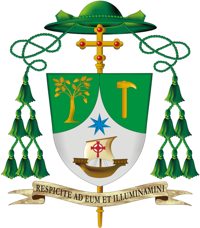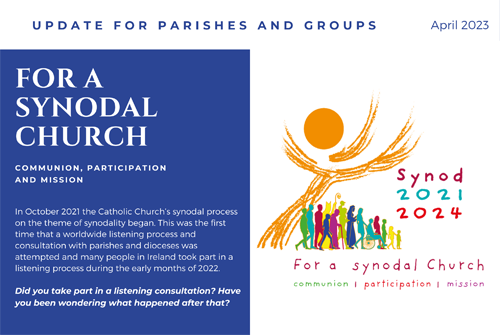Universal Synodal Assembly in Rome, October 2023
Tionól Sionaid Uilíoch sa Róimh, Deireadh Fómhair 2023
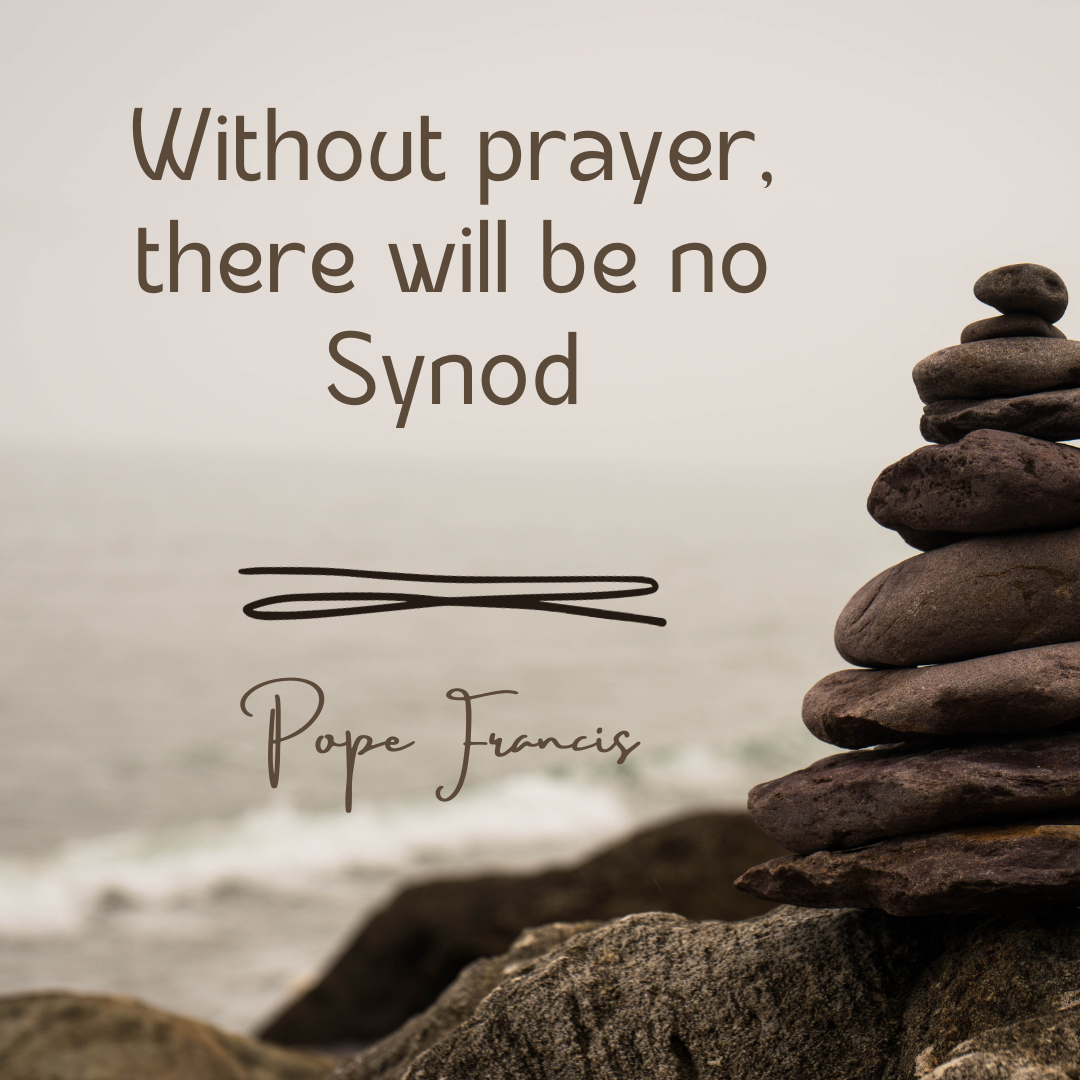 Bishop Michael asks the priests and people of the Dioceses of Clonfert, Galway, Kilmacduagh, and Kilfenora to pray for Pope Francis and the participants in the Synodal Assembly that opens in Rome on 4th October 2023, and to continue that prayer for the month of October.
Bishop Michael asks the priests and people of the Dioceses of Clonfert, Galway, Kilmacduagh, and Kilfenora to pray for Pope Francis and the participants in the Synodal Assembly that opens in Rome on 4th October 2023, and to continue that prayer for the month of October.
Iarann An tEaspag Mícheál ar na sagairt agus ar mhuintir na Deoise Chluain Fearta, Ghaillimh, Chill Mhic Dhuach agus Chill Fhionnúrach guí do Phápa Prionsias agus na rannpháirtithe sa Thionól Sionaid atá ag oscailt sa Róimh ar an 4ú Deireadh Fómhair 2023. Agus lean oraibh ag guí an phaidir le linn mí Dheireadh Fómhair.
“As you are aware, Pope Francis convened the Church throughout the world in Synod in October 2021. This began with a consultation of the People of God. We are now approaching another milestone in this process with the opening of the first assembly of The Sixteenth Ordinary Session of the Synod of Bishops: “for a Synodal Church, Communion, Participation and Mission”. This assembly will begin in Rome on 4th October and continue until 29th October 2023. Pope Francis has stated that “without prayer there will be no Synod”. It is only right that every diocese, parish, religious house and faith community in the world would pray for a fresh outpouring of the Holy Spirit on the Synodal Process and the Assembly. I ask every person of faith, all people of good will, every parish community, religious communities and organizations in our dioceses to pray for the Church at this time.” – Bishop Michael.
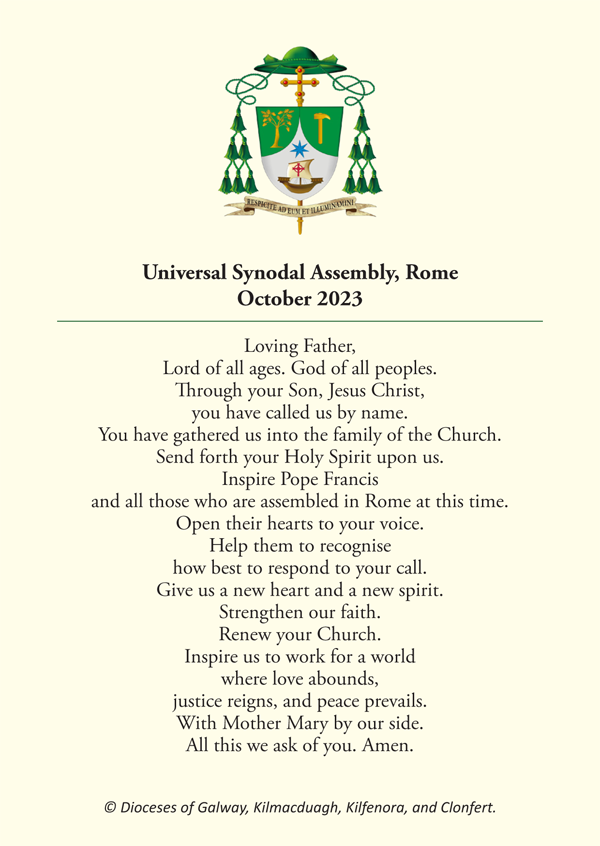 Loving Father,
Loving Father,
Lord of all ages. God of all peoples.
Through your Son, Jesus Christ,
you have called us by name.
You have gathered us into the family of the Church.
Send forth your Holy Spirit upon us.
Inspire Pope Francis
and all those who are assembled in Rome at this time.
Open their hearts to your voice.
Help them to recognise
how best to respond to your call.
Give us a new heart and a new spirit.
Strengthen our faith.
Renew your Church.
Inspire us to work for a world
where love abounds,
justice reigns, and peace prevails.
With Mother Mary by our side.
All this we ask of you. Amen.
© Dioceses of Galway, Kilmacduagh, Kilfenora, and Clonfert.
-----------------------------------------
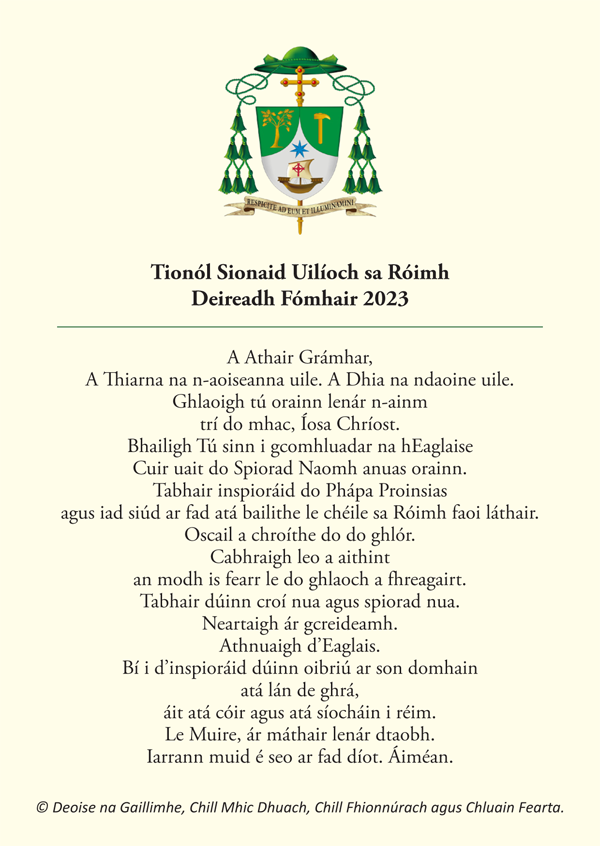 A Athair Grámhar,
A Athair Grámhar,
A Thiarna na n-aoiseanna uile. A Dhia na ndaoine uile.
Ghlaoigh tú orainn lenár n-ainm
trí do mhac, Íosa Chríost.
Bhailigh Tú sinn i gcomhluadar na hEaglaise
Cuir uait do Spiorad Naomh anuas orainn.
Tabhair inspioráid do Phápa Proinsias
agus iad siúd ar fad atá bailithe le chéile sa Róimh faoi láthair.
Oscail a chroíthe do do ghlór.
Cabhraigh leo a aithint
an modh is fearr le do ghlaoch a fhreagairt.
Tabhair dúinn croí nua agus spiorad nua.
Neartaigh ár gcreideamh.
Athnuaigh d’Eaglais.
Bí i d’inspioráid dúinn oibriú ar son domhain
atá lán de ghrá,
áit atá cóir agus atá síocháin i réim.
Le Muire, ár máthair lenár dtaobh.
Iarrann muid é seo ar fad díot. Áiméan.
© Deoise na Gaillimhe, Chill Mhic Dhuach, Chill Fhionnúrach agus Chluain Fearta.
June 2023
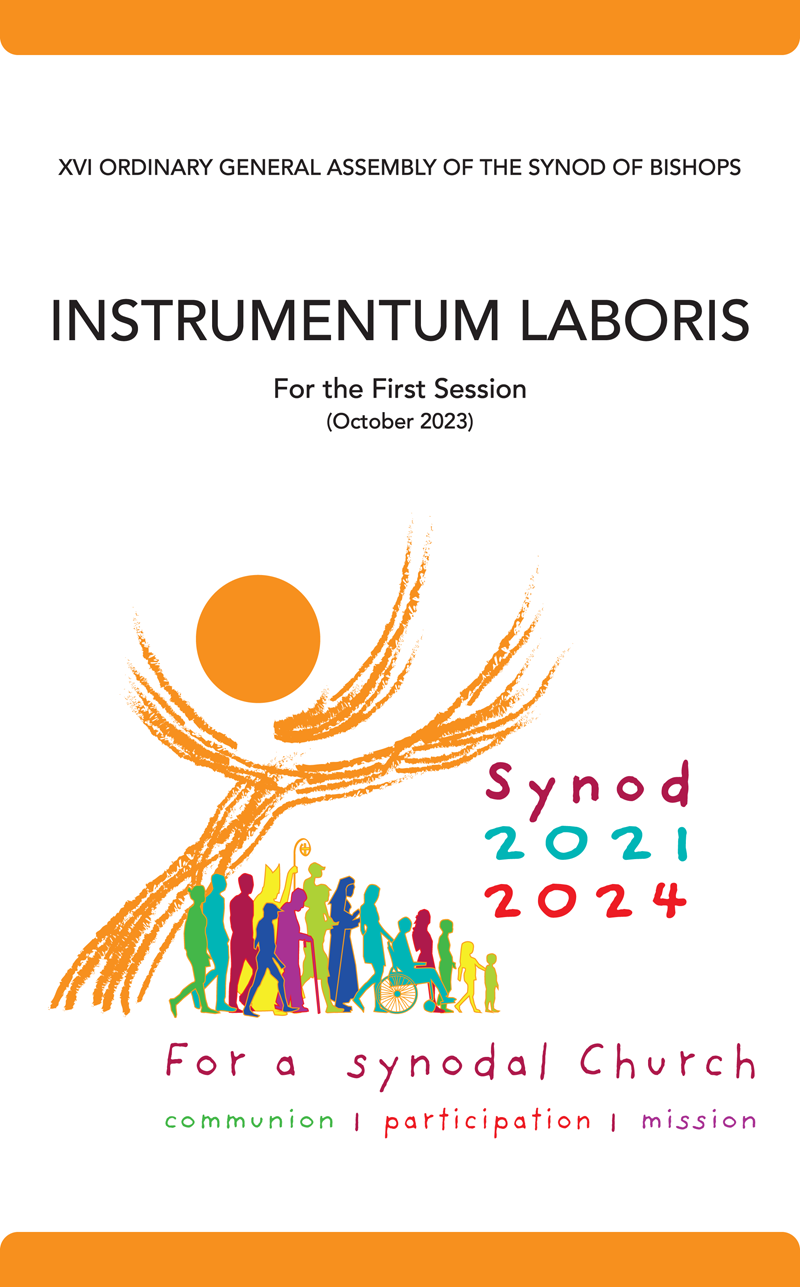 Instrumentum Laboris, the official working document for the first session of the 16th Ordinary General Assembly of the Synod of Bishops, was launched today, 20 June 2023. A large number of people from various parts of the world with different expertise prepared this important text, which will animate all the work of the October assembly. To access Instrumentum Laboris just click on the image or click here.
Instrumentum Laboris, the official working document for the first session of the 16th Ordinary General Assembly of the Synod of Bishops, was launched today, 20 June 2023. A large number of people from various parts of the world with different expertise prepared this important text, which will animate all the work of the October assembly. To access Instrumentum Laboris just click on the image or click here.
Video: Julieann Moran and Fr Eamonn Fitzgibbon had the responsibility at the Continental Synodal Assembly in Prague of relaying in six minutes some of the key insights that emerged in the synodal process in Ireland. We hear from them what were the issues that they focused on and what took away from the Assembly itself.
Video: Nicola Brady (Chair of the Steering Committee of the Irish Synodal Pathway) discusses the learnings from the recent Continental Assembly in Prague and how synodality has helped people engage with challenging issues in a constructive, prayerful and collective way.
Video: Rafael Luciani discusses how synodality has developed in Latin America since Vatican II, and some of the deeper roots of synodality in our Church's tradition. Rafael is a lay Venezuelan theologian who serves on the Theological Commission of the General Secretariat for the Synod of Bishops.
Video: Susan Pascoe shares her experience of synodality in helping to draft the Document for the Continental Stage in Frascati, and more recently attending the Continental Assembly in Suva, Fiji.
Continental Stage of Universal Synod 2021–2024 :: Irish Synodal Pathway
Diocese of Galway, Kilmacduagh and Kilfenora :: Diocese of Clonfert
This Submission was prepared by a joint group of participants from the two dioceses in response to the Diocesan, National and Continental Syntheses
Read below or click here for a pdf.
6 January 2023
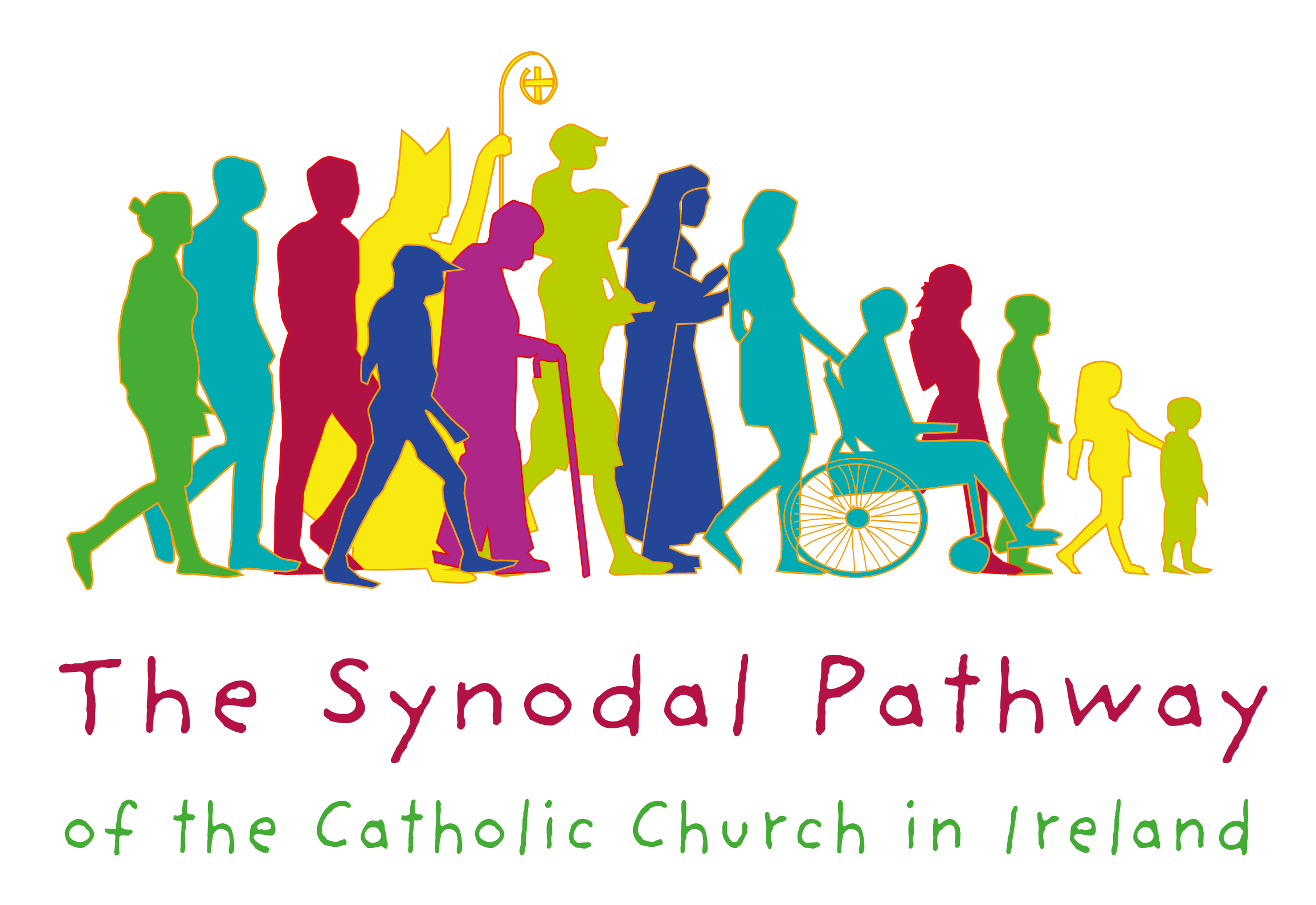
EXPERIENCES OF THE CHURCHES
There is an awareness that God IS preparing something new and we are called to participate in this plan. The synodal process itself is seen as a means of opening horizons of hope for the fulfilment of the Church’s mission and certainly “listening to the faithful” has strengthened the feeling of belonging to the Church.It is clear, that while there are similarities in themes across all documents, there are also very different priorities on the five continents. Issues that are strong in Western countries, e.g. LGBTQIA+ and the role of women, may not find such a strong echo in the African church. However, there was a great feeling of belonging to the Church, in spite of the tensions, along with the realisation, on a practical level, that the Church is not just priests and bishops.
The DCS points out the standout themes that appear again and again in the Church — inclusivity, co-responsibility, accountability, the roles of women, the shortage (at least in the Western Church) of vocations to the priesthood and religious life, transparency, etc. As we journey we must name the “lights and the shadows” of our Church’s life.
There is a clear desire across the continents to “enlarge the tent” and move forward in mission; a desire to be more inclusive and to welcome diversity. But we need to watch our language. The DCS itself appears to be aimed at clergy or people with a theological background. It is difficult to understand in parts.
Ultimately, the overall experiences of the Churches are that we are learning to walk together, sitting together to break the one bread. Again and again we are reminded that no one is to be excluded. This is coupled with an experience of a less than satisfactory participation/input from priests and bishops in the process and the meagre presence of the voice of young people.
The final goal is high — “a Church that boldly proclaims its authentic teaching while at the same time offering a witness of radical inclusion and acceptance through its pastoral and discerning accompaniment. And while the Eucharist continues to be the “source and summit” of a synodal Church, synodal listening itself brings up many issues from rethinking a liturgy too concentrated on the celebrant, to the active participation of the laity and access of women to ministerial roles.
CHALLENGES TO ADDRESS
The challenge facing us is the creation of a world-wide Church that truly is “stretching out”, “making room for diversity without losing its spirituality and core historical value”. Almost all reports highlight the issue of “full and equal participation of women”, but there is no agreement on a single or complete response to bring about such full and equal participation. A key challenge will be enabling women to participate more fully at all levels of Church life everywhere.
There is very little mention of youth/adult ongoing faith formation in the DCS. There is an urgent need to renew the focus on our youth, while at the same time continuing to nurture those adults committed to their faith journey. “We are a learning Church, and to be so we need continuous discernment to help us read the Word of God and the signs of the times together, so as to move forward in the direction the Spirit is pointing us”. Biblical and faith formation is going to be a huge challenge.
Regarding ongoing faith formation, the Church has to be aware of not watering down the core message of our Christian beliefs to a lowest common denominator. The synodal process has given the Church a new energy and so expectations of rapid change are high. “For many, radical inclusion means radical change” and the challenge will be to see all within the context of the call to personal conversion and reform of the Church, while maintaining its mission based on the person and teachings of Jesus Christ.
The clerical abuse in the Church has turned many people away and this is a huge challenge for the future. While much has been done in this area, so much more remains to be done.
Ridding the Church of clericalism has to be a priority if synodality is to take hold. The DCS stresses the role of all the faithful, by merit of their Baptism, in a synodal Church — ALL can help to fulfil the Church’s mission. The involvement of the entire People of God becomes a challenge and a priority as the Church faces an aging clergy and a dramatic reduction in vocations to the priesthood and the religious life. “The laity are capable, talented and willing to contribute more and more, provided they are given opportunities” — therein lies the big challenge, coupled with the wish that no one should be excluded.
PRIORITIES AND CALLS TO ACTION (LOCAL DIOCESE/COMMUNITY)
People are moving away from Church, Mass, Sacraments etc., with the claim of being ‘spiritual’ but not ‘religious’.
Reassure those concerned about Synodality that the Church’s fundamental teachings will not change, nor how decisions are made within the Church. Local churches should speak about the Synodal process, awakening people to the renewal that is taking place. Most are unaware of the process.
Celebration of Sacraments of Initiation alone has not led to a daily life of faith. There is an urgent need for ongoing faith formation at all levels — youth and adult — which is proactive and where no one is excluded. This formation must be given the same priority and resources as the provision of the Sacraments themselves.
Arising from this synodal listening process is the desire and appetite for enriching our lives with the Word of God.
We must become conscious of the role of the laity, and in particular, women, in the Church we dream of. The desire is there for a genuine reform and renewal of our Church and we are aware of the importance our faith witness is going to have in the consumerist society in which we live.
The sense of belonging has to be more than pious platitudes. We need a Church that is reflective of inclusiveness, recognising the inconsistency in the Church’s message and what is perceived to be Christ’s inclusive message, e.g., the makeup of families today, the LGBTQIA+ community, family planning and the Church’s response to poverty and climate change.
PRIORITIES AND CALLS TO ACTION (The Catholic Church in Ireland)
Structures and processes for synodality are not in place; while structures in themselves are not enough, there is a need for ongoing formation to support a synodal culture.
The synodal process is broad and progress is likely to be slow. In the meantime the Church must continue to work on local issues; co-responsibility, lay participation, adult faith formation etc. The People of God struggle to believe, against and within an ever more secular background.The Church needs to encourage clergy and religious to really commit to the Synodal process. It seems there has been a lack of interest on the part of many clergy and bishops to the process.
Clerical abuse in the Church has turned many people away — this still needs to be dealt with. We must not be afraid of the sins and shadows of the past. Those abused by the Church must be listened to and hurts must be healed.
Dreaming of a Church where everyone IS welcome, we have to be aware of the LGBTQIA+ community, those separated/divorced, divorced and remarried, those with disabilities, travellers, migrants, the elderly, those disillusioned or disenfranchised from the Church for whatever reason. There must be a genuine focus on our youth.
The role of women within the church and their exclusion from many roles, along with a broader understanding and support of different family types.
Care and support for our aging priests/religious, coupled with a new model of parish where everyone is using the gifts given them by God.
PRIORITIES AND CALLS TO ACTION (The Universal Church)
There needs to be a renewed and genuine focus on our youth, alongside a focus on a reinvigorated adult ongoing faith formation programme. The process of discernment must continue; we must be mindful that while participation was widespread across continents, only a relatively small number of practising Catholics participated in the initial stage of the synodal process, and an even smaller number of youth!
The Church must continue its momentum towards becoming a Missionary Synodal Church. The need to provide formation in synodality must be a priority.
The need for life-long biblical/faith/religious formation is another priority. The People of God need this education if they are to grow in an awareness of who they are and what God expects of them. This formation must also include examples of how we integrate faith and culture.
Again and again we hear the call for women to be given equal treatment in leadership and decision making. The Church has to respond to these calls and the response must be visible.
There has to be greater compassion and awareness of what comprises a ‘family’ today, sexual identity, human population growth, global warming and the ensuing crises. We live in a rapidly changing society of which we are a part; it is in this society that we are called upon to be disciples. An urgent call for better care of the earth locally, nationally and globally needs to be voiced. It has been hardly mentioned at all, though very close to Pope Francis’ heart.
